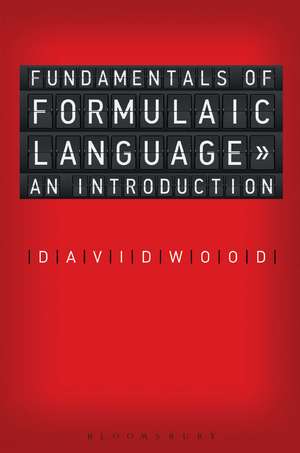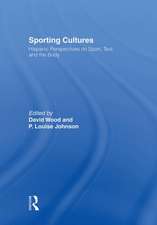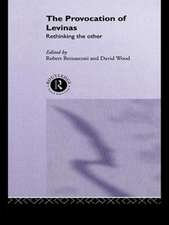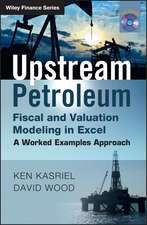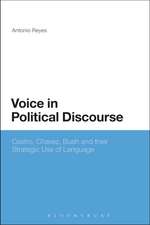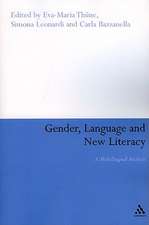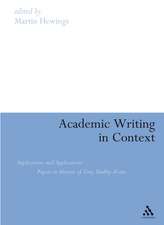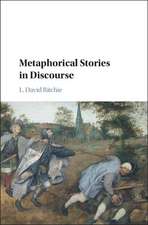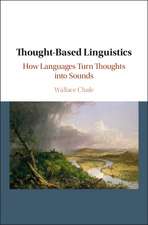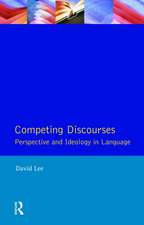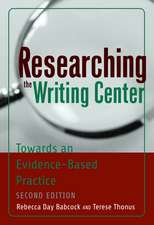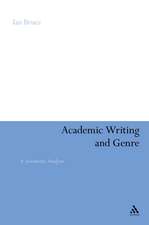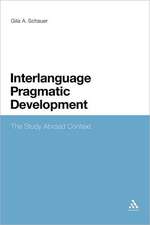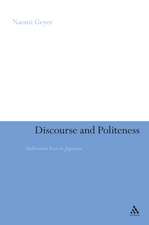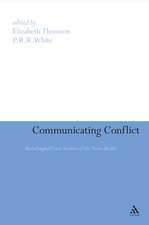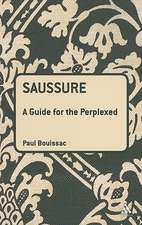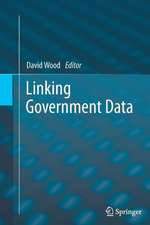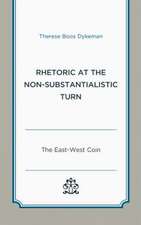Fundamentals of Formulaic Language: An Introduction
Autor David Wooden Limba Engleză Paperback – 16 dec 2015
| Toate formatele și edițiile | Preț | Express |
|---|---|---|
| Paperback (1) | 237.75 lei 6-8 săpt. | |
| Bloomsbury Publishing – 16 dec 2015 | 237.75 lei 6-8 săpt. | |
| Hardback (1) | 831.43 lei 6-8 săpt. | |
| Bloomsbury Publishing – 16 dec 2015 | 831.43 lei 6-8 săpt. |
Preț: 237.75 lei
Preț vechi: 272.79 lei
-13% Nou
Puncte Express: 357
Preț estimativ în valută:
45.51€ • 49.45$ • 38.25£
45.51€ • 49.45$ • 38.25£
Carte tipărită la comandă
Livrare economică 21 aprilie-05 mai
Preluare comenzi: 021 569.72.76
Specificații
ISBN-13: 9780567278982
ISBN-10: 0567278980
Pagini: 208
Ilustrații: 10 illus
Dimensiuni: 156 x 234 x 18 mm
Greutate: 0.36 kg
Editura: Bloomsbury Publishing
Colecția Bloomsbury Academic
Locul publicării:London, United Kingdom
ISBN-10: 0567278980
Pagini: 208
Ilustrații: 10 illus
Dimensiuni: 156 x 234 x 18 mm
Greutate: 0.36 kg
Editura: Bloomsbury Publishing
Colecția Bloomsbury Academic
Locul publicării:London, United Kingdom
Caracteristici
Each chapter features an 'In Summary' section and 'Points To Ponder', which guide and prompt further study.
Notă biografică
David Wood teaches applied linguistics at Carleton University, Canada, where his research interests lie in formulaic language, acquisition of L2 spoken language and academic discourse, and language teacher education. He has taught English language and applied linguistics in Canada, Greece, and Japan.
Cuprins
1. Formulaic Knowledge: Historical Overview 2. Defining Formulaic Language3. Categorizing Formulaic Language4. Mental Processing of Formulaic Language5. Formulaic Language in First and Second Language Acquisition6. Formulaic Language and Spoken Language7. Formulaic Language in Written Language8. Lexical Bundle Research in Formulaic Research9. Formulaic Language in Language TeachingBibliographyIndex
Recenzii
A useful reference book ... in this extremely important and vast field of language study.
A comprehensive yet accessible introduction to research on formulaic language. Fundamentals of Formulaic Language provides a wide coverage of topics such as identification, processing, acquisition, and teaching of formulaic language, concluding with a useful discussion of future directions for research. The up-to-date examination of this highly researched area in Applied Linguistics will make it a valuable resource for graduate students, researchers, and experienced teachers.
This is a timely and valuable contribution to the field of formulaic language. Each chapter includes an accessible introduction and gives a comprehensive overview of the literature in the field. Practical ideas and examples are provided and supplementary questions at the end of each chapter are valuable to use in class and give inspiration to researchers. This will become an essential textbook for postgraduate and undergraduate students of linguistics, applied linguistics, psycholinguistics, lexis, and language teaching.
In Fundamentals of Formulaic Language: An Introduction, David Wood presents a highly readable synthesis of current knowledge that will interest language instructors and stimulate further research on this topic in SLA and applied linguistics. He first traces the path from such diverse early areas of study as epic sung poetry, aphasia, phraseology and collocations to our current recognition of the essential role of formulaic multi-word sequences in first and second language learning, processing and fluent use. The book's systematic coverage of current conceptualizations of formulaic language, relevant research perspectives and methods, and increasing attention to theoretical issues, with summaries and thoughtful questions at the end of each chapter, make it a useful introductory reference and likely graduate textbook. A particular value for second language instructors is Wood's attention to the challenges formulaic language poses for adult learners in achieving oral and written fluency, his own research area. The comprehensive, up-to-date bibliography is a valuable tool for researchers. Throughout the book, Wood makes clear the gaps in knowledge and methodological issues to be resolved, and in the last chapter, the need to focus on developing adequate theory to account for what is known. The existence of this book moves the starting point and will almost certainly contribute to progress towards that goal.
An insightful, essential and comprehensive account of formulaic language ... Given the wide range of topics covered, the book will prove to be a very useful resource for researchers, practitioners of language acquisition, and classroom teachers.
A comprehensive yet accessible introduction to research on formulaic language. Fundamentals of Formulaic Language provides a wide coverage of topics such as identification, processing, acquisition, and teaching of formulaic language, concluding with a useful discussion of future directions for research. The up-to-date examination of this highly researched area in Applied Linguistics will make it a valuable resource for graduate students, researchers, and experienced teachers.
This is a timely and valuable contribution to the field of formulaic language. Each chapter includes an accessible introduction and gives a comprehensive overview of the literature in the field. Practical ideas and examples are provided and supplementary questions at the end of each chapter are valuable to use in class and give inspiration to researchers. This will become an essential textbook for postgraduate and undergraduate students of linguistics, applied linguistics, psycholinguistics, lexis, and language teaching.
In Fundamentals of Formulaic Language: An Introduction, David Wood presents a highly readable synthesis of current knowledge that will interest language instructors and stimulate further research on this topic in SLA and applied linguistics. He first traces the path from such diverse early areas of study as epic sung poetry, aphasia, phraseology and collocations to our current recognition of the essential role of formulaic multi-word sequences in first and second language learning, processing and fluent use. The book's systematic coverage of current conceptualizations of formulaic language, relevant research perspectives and methods, and increasing attention to theoretical issues, with summaries and thoughtful questions at the end of each chapter, make it a useful introductory reference and likely graduate textbook. A particular value for second language instructors is Wood's attention to the challenges formulaic language poses for adult learners in achieving oral and written fluency, his own research area. The comprehensive, up-to-date bibliography is a valuable tool for researchers. Throughout the book, Wood makes clear the gaps in knowledge and methodological issues to be resolved, and in the last chapter, the need to focus on developing adequate theory to account for what is known. The existence of this book moves the starting point and will almost certainly contribute to progress towards that goal.
An insightful, essential and comprehensive account of formulaic language ... Given the wide range of topics covered, the book will prove to be a very useful resource for researchers, practitioners of language acquisition, and classroom teachers.
